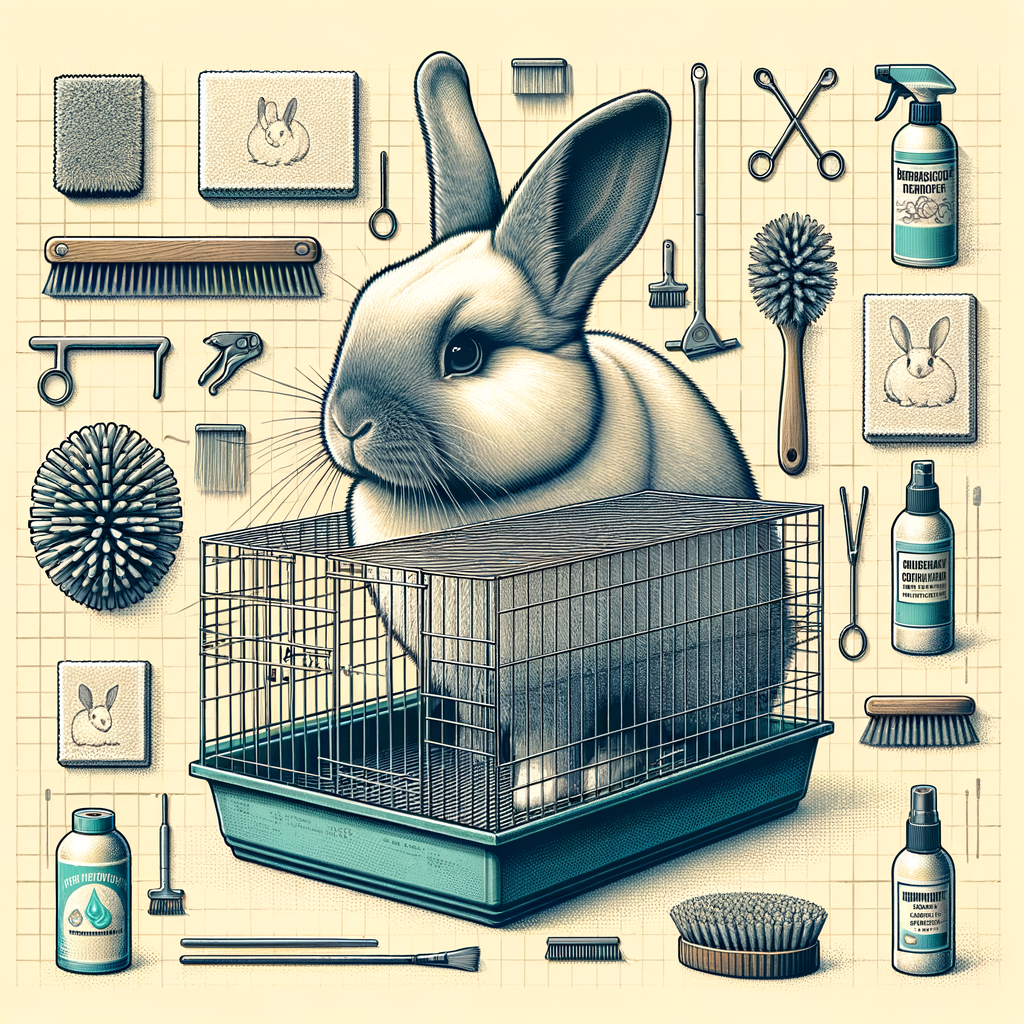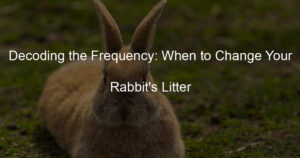
Introduction to Lionhead Rabbit Cage Cleaning
Keeping a Lionhead rabbit as a pet is a joyous experience. These adorable creatures have a unique charm that can brighten up any home. However, owning a Lionhead rabbit also comes with the responsibility of maintaining a clean and healthy environment for them. This includes regular cage cleaning, which is crucial for their well-being.
- Importance of Keeping a Clean Cage for Your Lionhead Rabbit
- Understanding the Basic Needs of a Lionhead Rabbit
Keeping a clean cage for your Lionhead rabbit is not just about aesthetics. It is a matter of health and safety for your furry friend. A dirty cage can lead to various health issues such as respiratory problems, skin infections, and even serious diseases like flystrike. In fact, according to a study, rabbits living in clean cages have a significantly lower risk of developing health issues compared to those living in dirty cages.
Moreover, a clean cage also contributes to the mental well-being of your rabbit. Rabbits are naturally clean animals and a dirty environment can cause them stress and discomfort. Therefore, regular cage cleaning is essential to keep your Lionhead rabbit happy and healthy.
Understanding the basic needs of your Lionhead rabbit is the first step towards providing them with a suitable living environment. These needs include a spacious cage, a balanced diet, fresh water, and regular exercise. However, one of the most important needs of a Lionhead rabbit is cleanliness.
Lionhead rabbits, like all rabbits, are sensitive to their environment. They require a clean and hygienic living space to stay healthy. This means that their cage should be cleaned regularly to remove any waste, leftover food, and dirty bedding. Additionally, the cage should also be disinfected periodically to kill any harmful bacteria or parasites.
In conclusion, maintaining a clean cage is not just about keeping your home clean, it’s about ensuring the health and happiness of your Lionhead rabbit. So, make sure to clean your rabbit’s cage regularly and keep an eye out for any signs of illness or distress in your pet.
Rabbit Cage Maintenance: A Comprehensive Guide
Keeping your rabbit’s cage clean is crucial for their health and happiness. In this guide, we will discuss the materials needed for rabbit cage cleaning.
Materials Needed for Rabbit Cage Cleaning
Before we begin, let’s gather all the necessary supplies. Here are the two main categories of materials you will need:
- Choosing the Right Cleaning Supplies
- Safe and Non-toxic Cleaning Products for Your Rabbit Cage
Choosing the right cleaning supplies is essential for effective rabbit cage maintenance. You will need a scrub brush to clean the cage, a dustpan and brush to sweep up any mess, and a bucket for water and cleaning solution. It’s also a good idea to have some rubber gloves to protect your hands during the cleaning process.
When it comes to cleaning products, it’s important to choose ones that are safe and non-toxic for your rabbit. Rabbits have sensitive respiratory systems, so avoid using harsh chemicals. Instead, opt for a mild dish soap or a vinegar and water solution. These are safe for your rabbit and effective at cleaning their cage.
Now that we have our supplies ready, we can move on to the cleaning process. Remember, regular maintenance of your rabbit’s cage is key to ensuring a healthy and comfortable environment for your pet.
Steps to Clean a Rabbit Cage
- Removing the Rabbit from the Cage
- Cleaning the Cage
- Disinfecting the Cage
- Replacing Bedding and Toys
Before you start cleaning, it’s important to ensure the safety of your rabbit. Carefully remove your rabbit from the cage and place it in a secure and comfortable area. This could be a playpen or a separate room that’s safe for your rabbit to roam around in while you clean.
Start by removing any leftover food, toys, and bedding. Use a dustpan or a small broom to sweep out any debris. Once the cage is empty, use a damp cloth to wipe down the cage. Make sure to clean all corners and crevices to remove any hidden dirt or waste.
After cleaning, it’s time to disinfect the cage. Use a rabbit-safe disinfectant to kill any lingering bacteria or germs. It’s important to remember that not all cleaning products are safe for rabbits, so always use products that are non-toxic and free from harsh chemicals. After disinfecting, rinse the cage thoroughly with water to remove any residue from the disinfectant.
Once the cage is clean and dry, you can replace the bedding and toys. Fresh bedding not only makes the cage comfortable for your rabbit, but it also helps to absorb waste and control odors. Toys are essential for your rabbit’s mental stimulation and physical exercise. Always ensure the toys are clean and safe for your rabbit to play with.
Cleaning your rabbit’s cage regularly is crucial for its health and happiness. A clean cage prevents diseases and ensures your rabbit has a comfortable and safe environment to live in. Remember, a happy rabbit is a healthy rabbit!
Cleaning Frequency for Rabbit Cages: How Often is Best?
Keeping your rabbit’s cage clean is crucial for their health and happiness. But how often should you be cleaning it? The answer isn’t as straightforward as you might think. It depends on several factors, which we will explore below.
Factors Influencing Cleaning Frequency
There are three main factors that can influence how often you need to clean your rabbit’s cage. Let’s take a closer look at each one:
- Size of the Cage
- Number of Rabbits
- Rabbit’s Health
The size of your rabbit’s cage can greatly affect how often it needs to be cleaned. Larger cages can accommodate more waste and mess, meaning they don’t need to be cleaned as frequently as smaller ones. However, this doesn’t mean you should neglect the cleaning of a larger cage. It’s still important to maintain a regular cleaning schedule.
The number of rabbits you have also plays a role in determining the cleaning frequency. More rabbits mean more waste, which in turn means more cleaning. If you have multiple rabbits, you may need to clean the cage more often to ensure it remains a healthy environment for them.
The health of your rabbit can also influence how often you need to clean the cage. If your rabbit is ill, it may produce more waste or have messier habits, requiring more frequent cleaning. Always keep an eye on your rabbit’s health and adjust your cleaning schedule as necessary.
In conclusion, the cleaning frequency for rabbit cages varies depending on the size of the cage, the number of rabbits, and the health of the rabbits. By understanding these factors, you can create a cleaning schedule that ensures your rabbit’s cage is always clean and comfortable.
Recommended Cleaning Schedule for Lionhead Rabbit Cages
Keeping your Lionhead rabbit’s cage clean is crucial for their health and happiness. Here is a recommended cleaning schedule that you can follow to ensure your pet’s environment is always clean and safe.
- Daily Cleaning Tasks
- Weekly Cleaning Tasks
- Monthly Cleaning Tasks
Every day, you should carry out some basic cleaning tasks. This includes removing any uneaten food and replacing the water in the water bottle. You should also remove any droppings or soiled bedding from the cage. This will help to keep the cage smelling fresh and prevent the build-up of bacteria.
Once a week, you should conduct a more thorough clean of the cage. This involves removing all the bedding and replacing it with fresh bedding. You should also clean the food and water dishes with warm soapy water. If your rabbit has a litter box, this should also be cleaned out and refilled with fresh litter.
Every month, you should carry out a deep clean of the cage. This involves removing everything from the cage and cleaning all surfaces with a pet-safe disinfectant. Be sure to rinse thoroughly to remove any residue from the disinfectant. Allow the cage to dry completely before replacing the bedding and other items. This monthly deep clean will help to prevent the build-up of bacteria and ensure your rabbit’s environment is as clean and healthy as possible.
Remember, a clean cage is a happy and healthy cage for your Lionhead rabbit. By following this recommended cleaning schedule, you can ensure your pet’s environment is always in the best possible condition.
Best Practices for Rabbit Cage Cleaning
Keeping your rabbit’s cage clean is an essential part of ensuring their health and happiness. Here are some best practices to follow when cleaning your rabbit’s cage.
- Proper Disposal of Waste
- Using the Right Cleaning Techniques
- Maintaining a Regular Cleaning Schedule
Disposing of your rabbit’s waste properly is crucial. Rabbits produce a lot of waste, and if not disposed of correctly, it can lead to unpleasant odors and potentially harmful bacteria. Always remove waste from the cage daily and dispose of it in a sealed bag in your outside trash bin. Never flush rabbit waste down the toilet as it can clog pipes and harm the environment.
When cleaning your rabbit’s cage, it’s important to use the right techniques to ensure a thorough clean. Start by removing all bedding and toys from the cage. Then, use a pet-safe disinfectant to clean the cage. Make sure to scrub all corners and crevices to remove any lingering bacteria. Rinse the cage thoroughly with warm water to remove any residual disinfectant, as it can be harmful to your rabbit. Dry the cage completely before adding new bedding and returning your rabbit to its home.
Maintaining a regular cleaning schedule is key to keeping your rabbit’s cage clean and hygienic. A good rule of thumb is to do a quick clean every day to remove waste and soiled bedding, and a deep clean once a week. This will help prevent the buildup of bacteria and keep your rabbit’s living environment clean and comfortable.
By following these best practices, you can ensure that your rabbit’s cage is always clean and safe. Remember, a clean cage is a happy cage!
Lionhead Rabbit Care: Beyond the Cage
When it comes to caring for your Lionhead Rabbit, there’s more to it than just keeping their cage clean. One of the most important aspects of rabbit care is their diet. Let’s delve into the details of feeding your Lionhead Rabbit.
Feeding Your Lionhead Rabbit
Feeding your Lionhead Rabbit a balanced diet is crucial for their health and well-being. Here’s what you need to know:
- Recommended Diet
- Feeding Schedule
Lionhead Rabbits thrive on a diet that includes a variety of foods. The majority of their diet should consist of fresh hay, which aids in digestion and provides the necessary fiber. In addition to hay, your rabbit should also have a daily serving of fresh vegetables like bell peppers, broccoli, and carrots. Lastly, a small amount of high-quality rabbit pellets can be included in their diet for additional nutrients.
Consistency is key when it comes to feeding your Lionhead Rabbit. Aim to feed your rabbit at the same times each day. Typically, rabbits should be fed twice a day – once in the morning and once in the evening. Remember, fresh water should always be available for your rabbit.
By following these guidelines, you can ensure that your Lionhead Rabbit is receiving the nutrition they need to stay healthy and happy.
Exercise and Play for Your Lionhead Rabbit
Keeping your Lionhead rabbit active and engaged is crucial for its overall health and happiness. Exercise and play are essential aspects of their care routine, just as important as feeding or cleaning their cage. Let’s explore why exercise is so important and what kind of toys are safe for your rabbit.
- Importance of Exercise
- Safe Toys for Your Rabbit
Exercise is vital for your Lionhead rabbit’s health. It helps keep their heart strong, their muscles toned, and their mind sharp. A lack of exercise can lead to obesity, which can cause serious health problems like heart disease and arthritis. It’s recommended that rabbits get at least 3 hours of exercise outside their cage each day. This doesn’t have to be all at once; it can be broken up into smaller sessions throughout the day.
When it comes to playtime, it’s important to provide your rabbit with safe toys. Toys help stimulate their minds and keep them entertained. Safe toys for rabbits include tunnels, balls, and chew toys. Avoid toys with small parts that can be chewed off and swallowed, as these can cause choking or digestive issues. Also, make sure the toys are made from safe, non-toxic materials. Here are some examples:
| Toy | Description |
|---|---|
| Tunnels | Tunnels mimic the burrows that rabbits would use in the wild. They can be made from cardboard or fabric. |
| Balls | Balls made from willow or grass are safe for rabbits to chew on and play with. |
| Chew Toys | Chew toys help keep your rabbit’s teeth healthy. They can be made from wood, hay, or other safe materials. |
In conclusion, exercise and play are key to keeping your Lionhead rabbit healthy and happy. Make sure they get plenty of exercise and provide them with safe, stimulating toys. Your rabbit will thank you!
Rabbit Habitat Maintenance: Ensuring a Healthy Environment
One of the most critical aspects of rabbit care is maintaining a healthy habitat. This includes regulating temperature and lighting, which are vital for your rabbit’s comfort and health.
Temperature and Lighting
Let’s delve into the importance of maintaining optimal temperature and lighting in your rabbit’s cage.
- Optimal Temperature for a Rabbit Cage
- Proper Lighting for Your Rabbit’s Health
Rabbits are sensitive to temperature changes. The ideal temperature for a rabbit cage is between 60 and 70 degrees Fahrenheit. Extreme temperatures can cause health issues like heatstroke or hypothermia. It’s essential to monitor the cage temperature regularly and make necessary adjustments to keep your rabbit comfortable and healthy.
Lighting plays a crucial role in your rabbit’s health. Rabbits need a balance of light and dark periods for their biological clock. They are most active during dawn and dusk, so it’s best to mimic this natural light cycle in their cage. Avoid placing the cage in direct sunlight or under bright artificial lights. Instead, provide a natural light-dark cycle with gentle indoor lighting.
In conclusion, maintaining the right temperature and lighting in your rabbit’s cage is not just about comfort, but it’s also crucial for their health. By keeping these factors in check, you can ensure a healthy and happy environment for your rabbit.
Space and Bedding
Creating a comfortable and healthy environment for your Lionhead rabbit involves providing enough space and choosing the right bedding. Let’s explore these two important aspects.
- Providing Enough Space for Your Rabbit
- Choosing the Right Bedding
Rabbits are active creatures that love to hop, run, and explore. It’s essential to provide them with enough space to move around freely. A cage for a Lionhead rabbit should be at least four times the size of your rabbit. This allows them to stretch out and hop around comfortably. Remember, the bigger, the better. If possible, provide an additional play area outside the cage for your rabbit to exercise and explore.
Bedding plays a crucial role in your rabbit’s comfort and hygiene. The right bedding should be soft, absorbent, and easy to clean. Paper-based bedding is a popular choice as it is dust-free and safe for rabbits. Avoid using cedar or pine shavings as they can cause respiratory issues. Change the bedding regularly to keep the cage clean and odor-free. Remember, a clean and comfortable cage contributes to a happy and healthy rabbit.
| Key Points | Details |
|---|---|
| Space | The cage should be at least four times the size of your rabbit. Provide an additional play area if possible. |
| Bedding | Choose soft, absorbent, and easy-to-clean bedding. Paper-based bedding is recommended. Avoid cedar or pine shavings. |
Rabbit Cage Cleaning Tips: Expert Advice
Keeping your rabbit’s cage clean is not just about aesthetics, it’s about health and happiness. A clean cage can prevent diseases and ensure your rabbit’s comfort. In this section, we will discuss some common mistakes to avoid and provide expert tips for efficient cleaning.
- Common Mistakes to Avoid
- Expert Tips for Efficient Cleaning
- Use a Cage Liner: This can make cleaning easier and faster. Simply remove the liner and replace it with a new one.
- Use a Safe Cleaning Solution: Avoid harsh chemicals. A mixture of vinegar and water is a safe and effective cleaning solution for rabbit cages.
- Have a Regular Cleaning Schedule: Cleaning your rabbit’s cage should be a regular part of your routine. This can prevent the buildup of waste and bacteria.
- Don’t Forget the Accessories: Remember to clean the food and water bowls, toys, and any other accessories in the cage.
Many rabbit owners make the mistake of not cleaning the cage frequently enough. Rabbits are clean animals and a dirty cage can lead to health problems. Another common mistake is using harsh chemicals for cleaning. These can harm your rabbit’s sensitive respiratory system. Lastly, many owners neglect to clean the water and food bowls regularly. These should be cleaned daily to prevent bacterial growth.
Here are some expert tips to make your rabbit cage cleaning routine more efficient:
Remember, a clean cage is a happy and healthy home for your rabbit. By avoiding common mistakes and following these expert tips, you can ensure your rabbit’s well-being and comfort.
Lionhead Rabbit Cage Hygiene: A Key Aspect of Proper Care
Keeping a clean cage is an essential part of caring for your Lionhead rabbit. It not only ensures a comfortable living environment for your pet but also helps prevent potential health risks. Let’s dive into what a clean cage should look like and the signs of potential health risks to watch out for.
Signs of a Clean Cage
A clean cage is more than just a tidy space. It is a sign of a healthy and happy rabbit. Here’s what to look for:
- What to Look for in a Clean Cage
- Signs of Potential Health Risks
Firstly, a clean cage should be free of waste and leftover food. The bedding should be dry and fresh. There should be no foul odors, and the cage accessories such as water bottles and food dishes should be clean and in good condition. Regularly replacing the bedding and cleaning the accessories is a good practice to maintain a clean cage.
On the other hand, signs of potential health risks include a strong, unpleasant smell, wet or soiled bedding, and leftover food that has started to mold. If your rabbit’s cage shows any of these signs, it’s time to clean it immediately to prevent health issues.
Remember, a clean cage is not just about aesthetics. It’s about providing a healthy and comfortable environment for your Lionhead rabbit. Regular cleaning and maintenance can go a long way in ensuring your pet’s well-being.
Impact of Cage Hygiene on Your Rabbit’s Health
Keeping your rabbit’s cage clean is not just about aesthetics; it’s a crucial part of ensuring your pet’s health and well-being. Poor cage hygiene can lead to a variety of health issues in rabbits. Let’s delve into the common health problems associated with poor cage hygiene and how you can prevent them through proper cage care.
- Common Health Issues Related to Poor Cage Hygiene
- Pododermatitis: Also known as “sore hocks,” this painful condition occurs when a rabbit’s feet become inflamed due to prolonged contact with dirty bedding.
- Respiratory Infections: Ammonia from urine buildup in a dirty cage can cause respiratory issues in rabbits.
- Parasitic Infestations: Parasites like mites and fleas thrive in dirty environments and can infest your rabbit, causing discomfort and potential illness.
- Preventing Health Issues Through Proper Cage Care
- Regular Cleaning: Clean your rabbit’s cage at least once a week. This includes changing the bedding, scrubbing the cage with a pet-safe cleaner, and washing food and water dishes.
- Spot Cleaning: In addition to weekly cleanings, spot clean areas where your rabbit urinates or defecates daily.
- Proper Bedding: Use comfortable, absorbent bedding that is easy to clean and change regularly.
- Regular Vet Check-ups: Regular vet visits can help catch any potential health issues early and provide guidance on proper cage care.
When a rabbit’s living environment is not kept clean, it can become a breeding ground for bacteria and parasites, leading to several health problems. These include:
Proper cage care is essential in preventing these health issues. Here are some tips:
Remember, a clean cage is a happy and healthy home for your rabbit. By maintaining proper cage hygiene, you’re not just making your pet’s living space more pleasant, but you’re also contributing significantly to their overall health and longevity.
Conclusion: The Importance of Proper Care for Lionhead Rabbit Cage
As we reach the end of our comprehensive guide on Lionhead rabbit cage care, it’s crucial to remember that the health and happiness of your furry friend greatly depend on the cleanliness and maintenance of their habitat. Let’s revisit some of the key points we’ve discussed.
- Recap of Key Points
- Final Thoughts on Lionhead Rabbit Care
Proper care for a Lionhead rabbit cage involves regular cleaning and maintenance. This not only ensures a hygienic environment for your pet but also helps prevent diseases. Cleaning frequency should ideally be once a week, with spot cleaning done daily. The use of safe, non-toxic cleaning products is highly recommended. Beyond the cage, Lionhead rabbits require a balanced diet, plenty of exercise, and regular vet check-ups.
Providing proper care for your Lionhead rabbit extends beyond just maintaining a clean cage. It’s about creating a safe, comfortable, and stimulating environment for them to thrive. Remember, a well-cared-for rabbit is a happy rabbit. With the right care and attention, your Lionhead rabbit can lead a healthy and fulfilling life.
As the famous quote goes, “A pet is not just a pet, but a member of the family.” Therefore, it’s our responsibility to provide them with the best care possible. This includes maintaining a clean and comfortable living space for them. In the case of Lionhead rabbits, a clean and well-maintained cage is the first step towards ensuring their overall well-being.
Thank you for taking the time to read this guide. We hope it has provided you with valuable insights into the importance of proper care for a Lionhead rabbit cage. Remember, the key to a healthy and happy rabbit lies in your hands.




